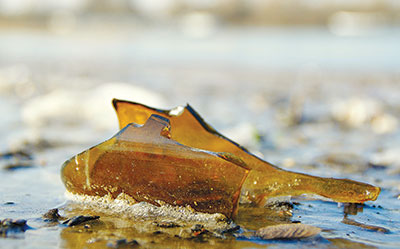The Federal Government Standing Committee on Industry, Innovation, Science and Resources last month launched an inquiry into Australia’s Waste Management and Recycling Industries.
Committee chair, the Hon Barnaby Joyce MP, said the inquiry would examine different processes within Australia, and differences between Australia and best practice in the world.
“The Committee will investigate innovative ways to reduce the millions of tonnes of waste discarded in landfill and waterways in Australia each year.”
Meanwhile, Infrastructure Victoria last month released a preliminary report on its examination into the waste sector, also looking at what works across the country and elsewhere in the world.
While advising that a six-bin system for households is needed for recycling best practice, the report calls for leadership from all levels of government and consistency across the state’s 79 council collections.
Taking the lead
City of Ballarat, Victoria, has already taken a step towards achieving best practice by removing glass from its roadside recycling collection.
Former Mayor, Councillor Samantha McIntosh, said, “Ballarat has been a strong leader in Victoria’s recycling space.
“When SKM collapsed Council refused to send the contents of yellow recycling bins to landfill.
“We took a ‘go it alone’ approach, working with local businesses to set up our own interim sorting facility. We are leading again with our decision to separate out glass.”
Australian Paper Recovery (APR) is the Victorian company now taking Ballarat’s paper, plastic and cans.
Managing Director, Darren Thorpe, said Ballarat was leading the local government sector with its decision to take glass out of all yellow residential recycling bins and should be applauded for leading by example.
“Ballarat is the largest Council in Victoria to have the foresight to separate glass out of all residential kerbside recycling bins. My prediction is that much of the rest of Victoria will follow Ballarat’s lead.
“Separating glass out from other recyclable materials is increasingly becoming the norm. The commercial reality is that the remanufacturing industry – the end users of the recyclable material – want material which is glass-free.
“APR sorts recyclables for reuse by Victorian remanufactures. These companies are demanding clean product. By that I mean paper and plastics which don’t have shards of broken glass in them.
“It’s not possible to reuse paper and cardboard to create moulded fibre products, things like egg cartons or fruit trays which are used to carry food, if there’s any chance they may have pieces of broken glass stuck in them. Imagine getting an egg out of the egg carton and being pricked by a piece of glass.
“In fact, the clean paper and cardboard supplied by the residents of Ballarat will help remanufacture over five million egg cartons each week, just one example of how clean recyclables can be reused.”
A gap in the market
Thorpe, who has been trading in plastics since 2002, said it was great seeing plastic milk bottles being turned into plastic pallets – a far more sustainable alternative to timber pallets – by a Victorian manufacturer. He said there was always a market for aluminium and steel cans which could be recycled repeatedly by the metal industry.
“We’re working to fill the gap in the residential recycling market. It’s satisfying to work with people who are equally committed to ensuring recycling material is handled in the right way, so its recycling potential is maximised.
“We work closely with our suppliers – organisations like Ballarat City Council – and our end product users, to ensure we provide clean recyclable material of a good enough quality that it will sustain a circular economy.”
Cr McIntosh said City of Ballarat’s new agreement with APR was a welcome outcome, with both organisations sharing a strong commitment to the circular economy.
“We continue to negotiate with industry operators to find a long-term sustainable market for Ballarat’s glass.
“Our ambition is to secure an agreement with an Australian glass remanufacturer who will make new bottles from our glass recyclables.
“Until then we’re encouraging residents to take their glass bottles and jars to one of several glass drop-off sites so it doesn’t end up in kerbside rubbish bins or in kerbisde recycling bins.
“This glass won’t go to landfill. Council is using the glass to embark on research and development remanufacturing opportunities.
“Removing the glass from the yellow recycling bins improves the likelihood that the rest of the bin’s contents will find their way back into the circular economy, and it maximises the potential for the glass to find its own market in the circular economy.
“Separating out glass is being increasingly accepted around the nation, with state and federal governments now exploring in more depth the collection systems required and the industry support required, to escalate the transition to a circular economy which includes glass.
“Assessments at the Smythesdale Landfill have shown up to 750 tonnes a year of paper and cardboard from our residential kerbside services end up in landfill after people have put it in their rubbish bin instead of their recycling bin, so we need to get better at what we
are recycling.”
The City is embarking on a waste education program, employing Kerbside Recycling Advisers to help residents understand better what can and can’t be recycled.

















